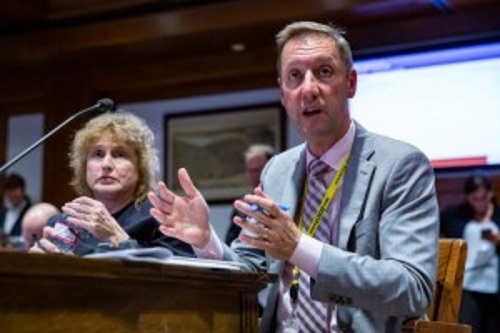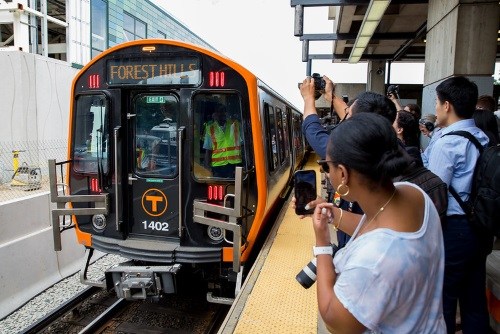Two 100 percent renewable energy contracts between the Massachusetts Bay Transportation Authority and BP Energy Company and Direct Energy LLC recently went into effect – reducing the agency’s carbon footprint and saving it over $3 million per year.
[Photo courtesy of the Massachusetts Governor’s Office.]
“These important investments in fully renewable energy, highlighted by the purchase of Renewable Energy Credits for the entirety of our electricity load, mean that the T has a dedicated commitment to electricity produced from renewable energy sources,” explained Steve Poftak, MBTA’s general manager, in a statement. “With the beginning of these new contracts, the T continues to expand its use of renewable energy in its portfolio, and furthers its commitment to supporting sustainable transit.”
MBTA – the public transit division of the Massachusetts Department of Transportation, which provides subway, bus, commuter rail, ferry, and paratransit service to eastern Massachusetts and parts of Rhode Island – finalized those two contracts in October 2020.

The total cost for those two contracts – which make the MBTA the largest transit agency in the United States to be 100 percent renewable – is approximately $12.13 million annually for a three-year term. The contracts include the purchase of Renewable Energy Credits or RECs for 100 percent of the MBTA’s electricity load as well as provisions for providing 70 percent of the electricity at a fixed price.
Purchasing RECs means the MBTA has bought electricity from a renewable power source with each certificate equivalent to the generation of one-megawatt hour or MWh of electricity, the agency said.
The MBTA added that it has a number of additional renewable energy projects completed and currently underway. One involves using two wind turbines in Kingston and Bridgewater help power MBTA facilities with electrical power; with the capability to sell unused power back to the electrical grid. Another involves small scale solar projects are complete at Orient Heights and Braintree Stations with solar canopy installation recently completed at three additional MBTA sites and more sites currently being explored.
Upcoming renewable energy projects to develop include the launch of a new solar power purchase agreement, the development of solar arrays at bus garages and train stations, along with further research into the potential for the MBTA to become an “anchor customer” for upcoming offshore wind projects.

